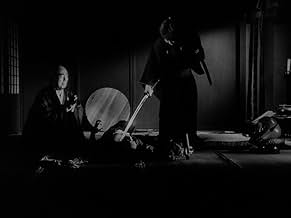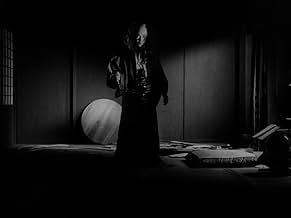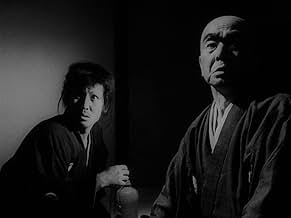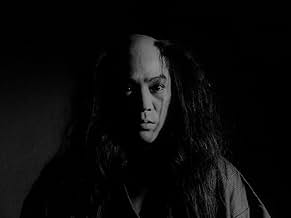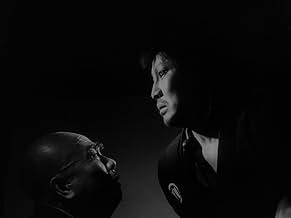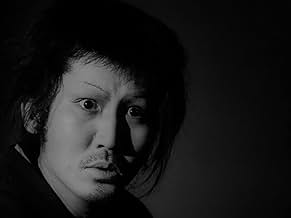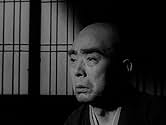Shura
- 1971
- 2h 14min
VALUTAZIONE IMDb
7,9/10
3259
LA TUA VALUTAZIONE
Aggiungi una trama nella tua linguaAfter being robbed by a geisha, a ronin warrior carves a bloody path to seek revenge.After being robbed by a geisha, a ronin warrior carves a bloody path to seek revenge.After being robbed by a geisha, a ronin warrior carves a bloody path to seek revenge.
- Regia
- Sceneggiatura
- Star
Recensioni in evidenza
A very slow burn of a horror movie. I had no idea what to expect from a Japanese movie from the 1970s. I've seen very few Japanese films overall, and definitely no horror ones.
I honestly have no idea how to contextualize this one. I have absolutely no frame of reference for what I just watched. Certainly unlike any film (that I know of) that was released before this. This makes me want to watch more Japanese films, and definitely more Japanese horror. That is the mark of a great film.
I wasn't sure whether I read the genre properly for this film because the build up is not typical of the genre.
Once it gets going it does not stop. And the circular storytelling is so satisfying. I wasn't feeling this one until it gets to around the halfway point and I realized this wasn't just horror for horror's sake. Really interesting film that I want to revisit someday, probably next October.
Hopefully I'll have a more nuanced understanding of the Japanese film scene by then.
I honestly have no idea how to contextualize this one. I have absolutely no frame of reference for what I just watched. Certainly unlike any film (that I know of) that was released before this. This makes me want to watch more Japanese films, and definitely more Japanese horror. That is the mark of a great film.
I wasn't sure whether I read the genre properly for this film because the build up is not typical of the genre.
Once it gets going it does not stop. And the circular storytelling is so satisfying. I wasn't feeling this one until it gets to around the halfway point and I realized this wasn't just horror for horror's sake. Really interesting film that I want to revisit someday, probably next October.
Hopefully I'll have a more nuanced understanding of the Japanese film scene by then.
A strangely hypnotic and violent tale of greed, betrayal and revenge, this tale is a masterclass in cinematography and lighting. In fact, this has to be among the best lit films I have ever seen. Set designs are minimal and intersting and so is the story and it manages to hold the attention pretty nicely. The middle section of the film is a bit slow and that could have been worked on but otherwise it's good. The twist at the end works well. All in all, a pretty masterful work of art and a very underrated piece of samurai cinema.
I don't know that there's anything in this movie which blew me away, but there was also nothing which bothered me either. I suppose the plot is a fairly straightforward revenge story, but the stylistic elements of the film were more than enough to save the film. For instance, I liked the usage of darkness and shadows in several scenes. I don't know if I can quite put my finger on why those elements work, but something about seeing various characters appear/disappear from the shadows gives the film a dreamy aesthetic. I also liked how certain scenes were repeated. Through these scenes, you get a sense of Gengobei imagining how he wants to behave in certain situations or how some of the violence he commits or witnesses it etched into his head. These scenes also cause the film to become a subjective experience which puts you in Gengobei's headspace really well. Finally, the high level of violence also surprised me. While certain elements like the slow motion and the (relatively) high levels of blood help in this regard, that most of the deaths are prolonged gives them even more staying power. All things considered, this is definitely the most violent classic samurai film I've seen. As I said at the start of this review, I wouldn't say this film blew me away, but I do have a lot of respect for the film's technical qualities. It's a stylistically impressive take on the revenge film which is so unique with its craft that you eventually stop caring about its somewhat barebones plot.
A stark, desperate tale of vengeance, Shura examines the plight of Gengobe - a Ronin (Samurai without Master) - and his quest to right the wrongs done unto him. This is basically the whole plot in a nutshell, but this isn't any kind of action adventure story or pulp fiction Samurai epic, rather a philosophical and meditative examination of manipulation and a misguided affection which blinds a man from his duty and true quest. True this is a staple of Japanese cinema - but it is one which has rarely been examined quite this painfully and as unflinchingly as it is in this film.
The theatrical origins of Matsumoto's film are very evident from the onset of this bleak piece, an extremely minimalist affair, but this only adds to the feeling of entrapment and claustrophobia. Daylight is glimpsed only once (the first shot as the sun sinks from the blood-red sky - also the only shot in colour) and the story plays out over the course of several nights.
As with his previous film 'Funeral Parade of Roses' Matsumoto employs many times a 'dual reality' device replaying scenes first as the protagonist imagines, and then as it actually happens, constantly keeping the viewer unsettled, with shocking - though never gratuitous - spurts of violence which one is torn between finding sympathy with and being repulsed by.
This is a film which is easier to admire than to actually like, but it's forlorn, doomed and - literally - lightless vision means it could only be truthfully recommended to those who are fans of truly downbeat cinema. A viciously dark night of the Soul.
9/10. 1 point deducted for not showing even the slightest glimmer of hope.
The theatrical origins of Matsumoto's film are very evident from the onset of this bleak piece, an extremely minimalist affair, but this only adds to the feeling of entrapment and claustrophobia. Daylight is glimpsed only once (the first shot as the sun sinks from the blood-red sky - also the only shot in colour) and the story plays out over the course of several nights.
As with his previous film 'Funeral Parade of Roses' Matsumoto employs many times a 'dual reality' device replaying scenes first as the protagonist imagines, and then as it actually happens, constantly keeping the viewer unsettled, with shocking - though never gratuitous - spurts of violence which one is torn between finding sympathy with and being repulsed by.
This is a film which is easier to admire than to actually like, but it's forlorn, doomed and - literally - lightless vision means it could only be truthfully recommended to those who are fans of truly downbeat cinema. A viciously dark night of the Soul.
9/10. 1 point deducted for not showing even the slightest glimmer of hope.
'Shura' also known as 'Demons' or 'maybe even better known as 'Pandemonium' is second feature by great experimenter Toshio Matsumoto. It is one of the most experimental samurai films I have ever seen, and one of the most disturbing revenge stories. The film begins with colorful sun setting to transform into bleak black and white cinematography. After a geisha deceives a samurai and robs him together with her husband, the samurai starts the bloody and twisted path of revenge that unravels many secrets and treats the viewer with such twists that makes M. Night Shyamalan go green with jealousy. The film is cool mixture of classic samurai movies and film-noir with the tasty sauce of Matsumoto's experimental techniques. More straightforward and less surreal than the director's better known 'Funeral Parade of Roses'.
Lo sapevi?
- QuizIncluded among Letterboxd's Top 250 Horror Films.
I più visti
Accedi per valutare e creare un elenco di titoli salvati per ottenere consigli personalizzati
- How long is Demons?Powered by Alexa
Dettagli
- Tempo di esecuzione
- 2h 14min(134 min)
- Colore
- Mix di suoni
- Proporzioni
- 1.37 : 1
Contribuisci a questa pagina
Suggerisci una modifica o aggiungi i contenuti mancanti

